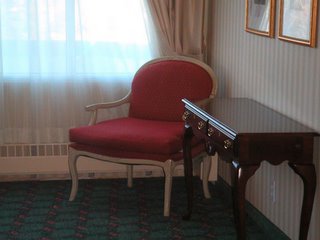Mary successfully defended her dissertation Thursday morning. It was not, I take it, a particularly pleasant experience.
Ph.D. defenses come in two flavours: the celebration of the completion of a significant project (wherein the candidate gets to occupy two hours of their favorite professor's time discussing the research that has preoccupied the candidate for the last four years); or a brutal hazing ritual, the point of which seems to be that if one survives it, one is supposed to feel like that is in itself an accomplishment that renders one worthy of membership in some elite group.
To give some idea of the range here, we have the experience of my colleague in the Education faculty who also defended last week, who related how the major topic of the defense was which publisher she should approach to publish the dissertation. In her case the advisor and committee members had already told her going in that she had passed, and the toughest question asked was, "would you consider applying for a job on our campus?" At the conclusion of the session, the committee 'debated' the outcome for less than a minute, and recalled the candidate to shake her hand and address her as "Dr."
In contrast is my own experience of the defense, in which one of the committee members (a well known and respected researcher) started with the question, "What's with all this Marxist crap, then?" After two years of my submitting chapters to this individual, I did not feel that the defense was the appropriate time to raise fundamental objections to the theoretical frame, but there it was. And the conversation went rapidly downhill from there. By the time the more sympathetic committee members got their turns to ask me questions, I was so punchy that I was unable to marshal anything coherent at all. I was then left waiting for what seemed like hours while the committee deliberated my fate, and when they finally informed me that I had passed, I was left with the strong impression I had just barely squeaked past. Indeed, my ego was so badly damaged in this process that I made little effort to publish from my dissertation, and suffered a severe case of 'impostor syndrome' for a decade after.
(The devastating effects of this defense were somewhat mitigated ten years later when one of the committee members finally told me what had happened when I'd left the room. The external -- a 'Great Man' of the field -- had turned to my antagonist and told him that he was the biggest ass he'd ever encountered, that he was clearly feeling threatened by my work, and that his attack on me was the most shameful display the external had ever witnessed in his lengthy career. He then turned to the Chair of the session (not my advisor; a departmental appointee), and told him that
he was an ass for allowing the defense to degenerate in that way, Since the external was speaking with the authority of both the role of external auditor and his own considerable reputation as the Grand Old Man of the Field, his view -- that mine was one of the most significant dissertations he had had the opportunity to review -- carried the day. But I dearly wish that I had known this ten years earlier so that I might have had more initial self-confidence as a researcher...)
Judging by my wife's description, I have now met someone whose defense experience was worse even than mine. Her defense was staged in front of an audience, and was so brutalizing that several of the
audience broke down into tears. After the fact, the committee apparently told members of the audience, mostly Mary's fellow Ph.D. students come to see how it was done, that Mary's was an exemplary presentation and even more exemplary defense, and that they would do well to emulate her. Although complimentary to Mary, it is difficult to see how this would be reassuring to an audience that had just watched this 'exemplary' candidate being publicly savaged. Instead, the exhibition left many of them questioning whether they wished to continue in the program if it meant placing themselves in the same position -- especially since Mary is widely acknowledged to be the best qualitative researcher of the group. (I understand that the program chair subsequently called a meeting of the PhD students to 'debrief' the experience in order to address the widespread panic generated by this public hazing.)
At the traditional dinner following the defense, the harshest of Mary's committee assured her that this hazing was a necessary part of the process, that she had attacked Mary out of a sense of duty to the field to demonstrate that Mary 'could take it', and that Mary, as one of the first graduates of this new PhD program and the first qualitative researcher in the field, was 'up to standard'. In other words, she and others of the committee subscribed to the view that the point of the defense is to see whether they can break down the candidate, and were pleased that Mary was able to endure the process and remain outwardly calm and effectively defend her work. That, in their view, is how it is supposed to go.
Of course, one contributing factor here might be Mary's quick wit and poker face which, I would wager, gave no hint of how she was actually reacting to the questions posed by the committee. Had they realized that she was taking their attacks personally, they might well have eased up, or at least phrased their questions more civilly. As it was, I can imagine them thinking, "Well, she took that in stride -- let's up the ante a bit!" But still, PhD students openly sobbing in the audience should be a hint that one has crossed the line from 'spirited defence' into 'bloodsport'.
In the end, the actual revisions required of Mary amount to adding about a dozen paragraphs and the removal of a single chart -- not exactly extensive. But the actual defense was so brutal that it has drained all the joy out of the accomplishment for Mary and made her start to question what are in my view her fundamental gifts. I find Mary now second guessing her writing skills because two of these positivists complained that her writing was 'too poetic'. Oh yeah, there is a devastating critique -- it is too well written! This is
a problem?! I keep thinking I want to write a novel based on my experiences in academia, but who would believe stuff like this?
The sociological function of hazing is well understood in establishing group solidarity in, say, elite military units -- the hazing standing in for and condensing the extended periods of combat that forged the existing unit into which the recruit is being inducted. It is less clear to me what purpose it serves in academia, other than to allow its victims to get their own back on the next generation. As an evaluation expert, however, I have to question the educational value of such hazing. How is this appropriate to academia?
The answer that it is tradtional -- that the defence emerged in the 1600s as part of the process wherein the student now proved himself equal to the master -- does not staisfy me, since the intervening 400 years have yielded a good deal of educational research that suggest there are better ways of doing things. By all means let us have rigor and high standards, and an oral component to the defense, but hazing... I do not see the point.



